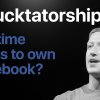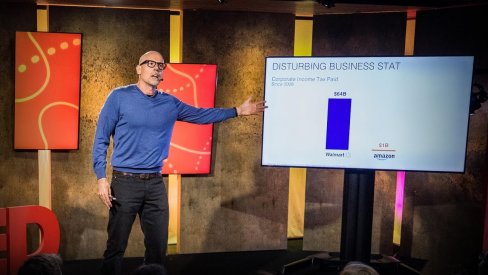
30 August 2017
We Own It founder Cat Hobbs makes the case for a Facebook we all own.
Just like the railway, Facebook is a private monopoly running a public service. We, the public, don't have real competition and consumer choice, but we don't have a democratic say as citizens either.
The internet has been a virtual wild west, fast-moving and little regulated, with tech companies competing for territory. But now there are clear natural monopolies developing.
Author Jonathan Taplin points out that Google has an 88% market share in search advertising, Facebook (and subsidiaries Instagram, WhatsApp and Messenger) owns 77% of mobile social traffic and Amazon has a 74% share in the e-book market.
Economic theory - and real life experience - suggests monopolies need to be regulated, if not brought into public ownership. Here are five reasons why all of us should own Facebook.
Nick Srnicek argued today in the Guardian that Google, Amazon and Facebook are 'platform monopolies' and suggested they should be nationalised. He explains that reaching a critical mass of users is key to the success of these businesses, and it's why they're so entrenched.
He's right. But if you're shouting "I don't want Theresa May getting hold of my Facebook data", we'd agree!
The solutions we need here are surely international, not national. And these companies have powerful data about private individuals - we should be wary about how governments could use this, especially in dangerous political situations. Could we create some kind of new cooperative, democratic, accountable institution rather than relying on nation states?
We believe in a broad definition of public ownership. It can be local, regional, national or international. And it can involve different models like cooperatives and community ownership - as long as profits are reinvested and there is democratic control.
We could think really imaginatively about what it would mean for the public to collectively own some of the public spaces on the internet. Put aside the practical challenges for a moment - we'll come back to those.
But what's the problem anyway? Those clever people at Facebook and Google know exactly what we want, don't they? And they're delivering? Not really..
If you've ever felt addicted to the internet, you're not alone. We're all endlessly scrolling through Facebook, messaging on Whatsapp or watching the next YouTube video. We might prefer to be out in the sunshine, playing with our children, or getting things done - but we're staring down at our phones. And it's not a coincidence.
We are the product here. Tech companies make money by advertising to us. So the more time we spend online, the better. These companies are in a race for our attention, and they're using their smartest designers in Silicon Valley to take as much of it as they can. These designers often protect their own children and themselves from their own technology.
They know that we get a shot of dopamine every time we see a notification. Those notifications make the internet addictive. Unpredictable but often rewarding - just like gambling in a slot machine, but easier to access.
They know that humans thrive on social praise and respond to social pressure. So they tell us when a message has been seen, so we feel pressure to always be in conversation.
They incentivise teenagers to collect 'streaks' of ongoing communication on snapchat, even if they have nothing to say - no wonder so many teens are staying indoors instead of going out partying. When we're feeling lonely, they give us somewhere to go.
They know how inertia works. So they autoplay the next video, they always give us something more to look at, they leave out any 'stopping cues'.
If we don't do something about it, the battle for your attention will only get more brutal.
Do we want to be checking our smartphones every few minutes in a state of addled confusion? It doesn't have to be this way.
Time Well Spent is a new movement which calls for better tech design. Its founder, Tristan Harris, explains the manipulative tricks that tech companies use to hijack our attention. He says designers could instead be tweaking technology on a large scale to make us less distracted online.
This could involve creating a new metric for measuring success on the internet which helps us live the lives we want. Couchsurfer is leading the way on this - it measures success by clocking up good time spent with new friends, and subtracting time spent online, counting it as a cost.
Perhaps there's a way of creating another metric that would work against fake news and for useful, authentic news sources?
But why would private tech companies want to do any of this? Why would they put our well being ahead of their profits from advertising?
Professor Philip Howard argues that 'Facebook is now public infrastructure and should be treated as such'. He believes the platform could help us solve social problems using big data. Public health, national security and democracy could all potentially benefit.
Social media - and the internet in general - creates an exciting marketplace of ideas that could help us all. But the barriers to entry are getting higher and higher.
When We Own It started up in 2013, there was much more 'organic reach' on Facebook (a good response to a post meant it would reach a bigger audience). Now, it's increasingly a place where organisations must pay to connect with their supporters and reach new ones. That trend is set to continue.
The deck is stacked in favour of multinationals with big advertising budgets, while smaller start ups (which may have good ideas) struggle to get a foothold.
The internet itself is a public space and so are social media. Facebook and Twitter are places where people share information, explore new ideas, promote products and coordinate political activity. They're not going away anytime soon - and we wouldn't want them to.
But right now, they are places where the rules are set and enforced by unaccountable corporations. For example, Facebook decides on the range of ‘reactions’ we can give (creating profitable data about our emotional states). It can decide what content will be censored, with no reference to us.
Facebook is not a democratic, online public space - but it could be. It could even help to create more accountability for global decision making – or provide a place to re-engage people in local decisions. We could rename it 'Placebook'.
Well, that's a tricky one.
The first option is to create an alternative platform. This is extremely challenging. Social media's power and attraction comes from its 'network benefits' – why switch platform if your friends are still on Facebook? A switch would need to be a coordinated, well promoted global effort to have a chance of success.
Another way forward would be buying out the existing social networks. This would be a huge challenge, financially and politically. There is a glimmer of hope however – there's currently a project for Twitter users to buy out Twitter, creating a community owned resource.
A third and final way could be to appeal to Zuckerberg directly! He's said he wants to 'take the long view and build the new social infrastructure to create the world we want for generations to come'. Zuckerberg, are you listening?! Could our social infrastructure be truly democratic please, and built for people, not profit?
There are no easy answers, but ultimately it's up to us to make this happen. Technology offers us so much - we need a real say over how it develops.
Facebook should belong to all of us. Love, like and share if you agree!

Photo used under Creative Commons licensing, thanks to Nicolas Nova.




Comments
Dave Lindsay replied on Permalink
I was about to post this comment on Facebook, in response to We Own It's post of this blogging, but then I realised that that just feeds into the hands of 'Facebook is the Internet' when in fact every organisation should have its own website for which it *is* in control.
To address this one we need an understanding of information capitalism and what the objectives of players in the market are. Paul Mason's book 'PostCapitalism' is a good source to this end.
Do we really need big corporations like Facebook to be brought into public hands or do we need to promote wider use of social media platforms whose mantra is to be not like the Facebook behemoth? Same goes for 'alternative' search engines.
David Nicholas Hirst replied on Permalink
There are laws in Britiain written for the monopolies and mergers commission. Monopolies are illegal. Oligopolies are legal
David Nicholas Hirst replied on Permalink
Perhaps it ought to be banned in the British Isles until they toe the line in the interim watch the UK news (or open an account with far 'snappier'TWITTER).
Alan Parker replied on Permalink
Facebook is too big to buy or influence in that way. It needs to be very, very carefully regulated, but the politicians and lawyers must keep it simple and properly consult us the users how we want it regulated.We need the regulation to be light and be under review to update sooner rather than later as events evolve!
Philip Maber replied on Permalink
Note of caution that big international charities are far from free of scandle, for example overpaid and unethical fund raisers and executives; and the American arm of Save the Children Fund awarding Tony Blair a prestigious Peace Award. I do agree though that there ought to be a democratic way forward!
carole thomas replied on Permalink
Agree totally with this but glad there is some debate going on
Chrsitian Guthier replied on Permalink
Easy: buy a few facebook shares. In other words, put your money where your mouth it. If everybody bought just a hand full of shares then FB would be in public hands.
carole thomas replied on Permalink
You mean like BT did and now look at them. We the public don't own it we just fund it.
Mick Walkden replied on Permalink
This is so wrong. You all need to stop being junkies and get a life. 18 months ago I did what you all should do, I closed my Facebook account. closed, shut, never go back. Now I am so much happier. Just close it down. It's easy.
John Light replied on Permalink
I agree. I don't use facebook, twitter, amazon or google because they are patently unethical. I would welcome an alternative similar to Wikipedia, and would contribute to funding it. I am sick of big business. Big Business is Bad For You! (It's bad for all of us).
Chrismac replied on Permalink
It seems as though you are unaware that a lot of the stuff on Wikipedia is untrue, manipulated propaganda so that Wikipedia is no better than Facebook, Google, Amazon. What I would like is an ethical alternative to these. I use DuckDuckgo as my search engine, never buy from Amazon and don't use Facebook or Google. What I would like is an ethical UK email address, if anyone knows of one.
Ian Wooller replied on Permalink
Facebook exists for a few and aim to censor those who disagree with those who oppose what it airs. If ownership was removed and placed in the hands of those who actually use it for good then everyone could feel free to openly discuss issues free from interference.
James replied on Permalink
As a software developer I couldn't agree to forcing intellectual property out of the hands of those who own it rightfully. If you think the monopoly is bad, compete against it. A difficult task but incentive is a way around that. Give people a reason to go elsewhere. You can't just take someone's intellectual property because they have no competition.
Ancly Ancly replied on Permalink
Facebook should be closed down. It promotes all the bad things in life plus you can't get away from the advertising. It was great when it was new, I got in as soon as it opened to non.ac.uk email addresses. No advertising and no videos, memes, gifs and all the other rubbish. It was used as intended for communication between friends, then families. Now it's so full of advertising and crap it should be closed down. Send an email, write a Web page.... People think 'it's the internet' when it isn't.
Alan Bond replied on Permalink
Back to '70s would mean going back to a time when public ownership was under serious attack from vested interests, even more than it had been since the days of the Churchill government, whose leader had consistently voted AGAINST setting up the NHS. Fortunately, the Attlee government had the majority to push through their agenda but the tories then spent the next sixty or so years trying to discredit public ownership by all and any means, both fair and foul and with the able assistance of Tony B Liar. It stands to reason that if something is not run to create wealth for individuals to hoard but for the benefit of all then it makes more sense.
Nick replied on Permalink
It's a great idea, I think that buying the uk subsidiary of Facebook would be too expensive and counterproductive. If people got involved at inception they would value the product more. Shares could be given when you join and you could have community causes that could be nominated to benefit from any profits, much like the cooperative do now. I'm sure there are software developers out there who would do it free or the costs could be crowd funded. People beta test all sorts of internet based technologies nowadays and actually pay for the privilege, Facebook wasn't so great and had a lot of issues when it began , what's needed is a usp that can't be found on another platform.
Robert replied on Permalink
People talk of using Facebook. But they don't. Facebook uses them. And they let it.
Facebook owns their data. They just give it away. There's no "sharing". It's a complete con.
A trance induction of global reach and proportions.
John replied on Permalink
One cautionary query to begin with: Have you registered the name Placebook?
Could it be construed as infringing on Facebook's intellectual property?
I support the idea of a mutually-owned service similar to Facebook but without all the advertising and selling-on of service users data.
This would mean the funding would have to come from the service users with regular on-line voting on the basis of one vote per person.
It would also presumably mean that all service users would have to pay annual subscriptions to remain paid-up status.
We all do this now to be members of organisations we choose to belong to.
The key question would be what amount the annual subscription would be?
Something like £20 per year is probably acceptable to most individuals.
Angie Jukes replied on Permalink
I love this idea - could we do the same with a cooperatively owned search engine that all phones could run from too?
John replied on Permalink
The key to ending this madness is to give the appropriate education in schools from an early age. We should teach about basic politics, capitalism, social interaction, health and wellbeing. These subjects are carefully avoided so that children grow up to be the ideal consumers.
Anonymous replied on Permalink
don't be ridiculous
Michael Edwards replied on Permalink
Good project. Go for it. I'm a Twitter user and am supporting the campaign for Twitter to become a users' co-op or similar. I don't use FB so I won't be active on this campaign. Best wishes.
Justine replied on Permalink
Whilst trying to make social media more accountable is worthwhile, and should be a serious business of governments, I can't believe anyone thinks this proposal is even possible. I think it is in the realms of fantasy, whereas renationalising our NHS and railways is entirely feasible and worth working for. Facebook is fine as long as you know how to manage it correctly. It's a useful tool. 'We Own It' should not waste energy on this. Are you sure it hasn't been proposed as a diversion to get you away from doing what is really needed?
Biba from We Own It replied on Permalink
Hi Justine, I can assure you that we would never propose something as a distraction. The NHS and Rail are very important and we continue to work hard on these issues, however we also feel it is also important to widen the picture and start a conversation about what other services would be better and more effective in public ownership in the future which is why we have brought up social media.
Free Software F... replied on Permalink
Fortunately, there are many efforts underway to provide distributed, user-controlled services to facilitate connection between people, including GNU social, status.net, Crabgrass, Appleseed and Diaspora. These services will not have the same kinds of problems, because both the communication-handling code and the communication data will be in the hands of the people doing the communicating.
See this article:
https://www.fsf.org/facebook
Add new comment